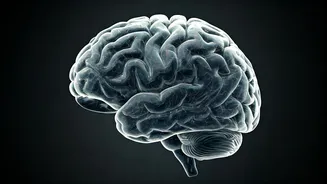Brain's Peak Performance
The conventional wisdom about brainpower is often centered around youth. However, a recent study has unveiled a different reality, suggesting that the
brain doesn't necessarily reach its peak performance during the early stages of life. This research offers a groundbreaking perspective on how cognitive abilities evolve over time. The findings challenge the long-held beliefs, indicating that the years of peak cognitive function might occur later than commonly thought. This shift in understanding prompts a reassessment of how we view cognitive aging and the potential for continuous improvement throughout life. The study underlines the significance of understanding the timing of optimal brain function for various aspects of life, including educational pursuits, career choices, and overall well-being. This research presents the possibility that the prime of our minds might be a more extended and adaptable stage than we've previously acknowledged.
Brain's Best Years
The specifics about the age range where the brain excels are critical to understanding these findings. While exact numbers might vary, the study's primary contribution lies in pinpointing a period later in life than typically assumed for maximum cognitive capacity. The concept challenges the idea that mental acuity inevitably declines after a specific age and instead proposes a more nuanced timeline. This perspective highlights the brain's plasticity and its capability to adapt and maintain high levels of performance even as we grow older. This has implications for how people strategize their personal and professional lives, inspiring the implementation of lifestyle choices that support brain health and cognitive function. This discovery urges people to embrace a lifelong learning attitude, recognizing that brain function is not static but rather dynamic and influenced by a variety of factors across the lifespan.
Cognitive Abilities Examined
The study's comprehensive examination of different cognitive abilities is another key element. It did not merely focus on a single aspect of brain function but also analyzed various cognitive skills such as memory, problem-solving, and information processing. By analyzing these facets of the brain, the researchers were able to create a more complete understanding of when the brain reaches its peak potential. This thorough approach provides a detailed picture of the brain's development and reveals that different cognitive skills might peak at different times. The research emphasizes the interconnectedness of these cognitive functions and how they contribute to overall brain performance. This examination of various cognitive abilities allows for a deeper comprehension of the complex interactions that lead to the brain's optimal functioning. This multifaceted approach is essential to understanding the complexities of human cognitive function throughout life.
Implications and Applications
The findings from this study have significant implications for how we view education, career development, and general health. Recognizing that the brain may peak later in life challenges people to rethink traditional age-related stereotypes, and it encourages people to continue learning and engaging in mentally stimulating activities. From an educational viewpoint, this research suggests that it may be beneficial to offer educational opportunities that can be accessed throughout a person's life, helping them to maintain and boost their cognitive skills. When it comes to careers, the results highlight the significance of lifelong learning and adapting to changes, rather than assuming that the peak has already been reached in early adulthood. Furthermore, understanding the timing of optimal brain function has the potential to influence public health policies and initiatives that encourage brain health and cognitive well-being. Ultimately, this research provides the necessary tools for individuals to recognize and optimize their cognitive potential during different life phases.
Future Research Pathways
This initial study lays the groundwork for additional studies to expand the current knowledge base about brain function. Future research should concentrate on delving deeper into the variables that influence cognitive peak performance, such as lifestyle choices, genetic predispositions, and environmental factors. Further research may look into the underlying neurological processes that govern the timing of peak brain function, using neuroimaging techniques. Such studies would help researchers to visualize the dynamic changes in the brain across the lifespan. In addition, it would be useful to explore variations in cognitive abilities between different people and groups, taking into account individual differences and cultural contexts. By investigating these facets, future research may provide a more comprehensive picture of the brain's development and cognitive abilities. This would enable the creation of more tailored interventions and strategies to support cognitive health and optimize brain performance across the lifespan.



















